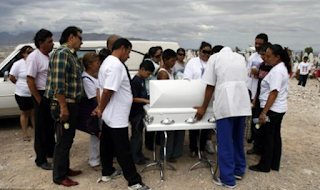Reality: Baptizing a Dead Baby
February 11, 2015

Vespers was just about over. Sweat ran down my
cassock and surplice in rhythmic drops while black-veiled widows droned
responses to my vesicles. Ave Maria gratia plena...on and on. Only
a dozen or so can create a concrete cutting sound grinding your brain. The
sweet scent of burning bee's wax candles offering up their gray smoke combined
with the widow's chanting left me distinctly light-headed. "Just
another night at church service", I
thought. All that changed in an instant with a loud thump as the two big wooden
doors of Iglesia Católica. Santa María de
Guadalupe (Tempoal de Sánchez, Veracruz) flew open at the back. Tempoal,
the name of the town, means 'place of the toads' in Wastek. Lightly armed
men began making their way toward the altar where I stood, clerically robed and
officiating at the service. Such a sight is a daily event in this little village,
but never in a church in my experience. Some carried pistoles, some machetes,
rakes, shovels, and even small hammers that struck me as quite odd. What would they do with these
things? The black-clad widows
stopped chanting and a child could be heard mumbling incoherently. Three of the
men fell to their knees at my feet and made the sign of the cross almost in
unison. Their compadres imitated the gesture while casting furtive glances around
the nave and the congregation as if assessing their wrath. "Andale
padre!... Andale!...Uun niño está cerca de la muerte. Andale!
Oh, that was a
great relief. We are in no danger. These men just wanted me to give sacramental
'Last Rites' to a dying baby. No problem. This came as no surprise.
Infant mortality in Mexico during the early 1960's was a high 13% in rural
areas like this little village of Tempoal near the seaport of Veracruz. This was
due primarily to poor sanitation education about river water surrounding the
village. That was one of the main reasons why I was in Tempoal with a cadre of
10 Georgetown University students and three seminarians in this summer of 1965.
We were to build an 4 room elementary school house for the parish and educate
the population in improved water sanitation. That was our mission. As
seminarians we took turns helping out the pastor with services like daily
vespers (evening prayers). This night was my turn in the barrel. The weapons
these men carried were simply meant to communicate an urgency, and 'no' would
not be an acceptable answer.

While gathering
the necessary travel sacramental 'kit' from the sacristy my every move was
closely shadowed. That was curious, but then this was not my country and
offending them was out of the question. Dismissing the congregation of
chanting widows we piled
into six camionettes (pick-ups)
and headed down the hill and out of town due north. In the lead truck, my place
between the two 'jefes' in the cab meant I had to straddle the floor-mounted
stick shift for about 2 hours’ drive on winding dirt roads into the hills. It
was well past 1o pm when I could hear faint sounds of what I took to be thunder
as many jack rabbits darted through our headlights. We stopped to piss and
heard rifle reports. Two men in the following trucks were laughingly shooting
at rabbits with remarkable accuracy in the low light. The thunder sound was
louder now, and I asked one of the jefes if a storm was imminent. Everyone
laughed at that. He told me that it was not thunder, but "bombas" dropping
on the General who was hiding in the hills about 20 miles further ahead with
his rebel regiment. We were in no danger. I remember hearing about this rebel
general when we got to Tempoal, but I dismissed it as local
folklore.

After another hour bouncing around in the cab
of the truck the road ended. In the headlights glare, four
Campesinos (peasant farmers) stood holding the reins of four horses. "Andele,
padre!" They still didn't accept that I was not actually a priest
but merely a seminarian. No matter I wore the collar and presided over vespers
and that was good enough. Technically, they were right since any baptized Catholic
can validly baptize someone. According to local mores, it just seems more valid
done by a priest.
The leaders assured me that it was a short horse trek to the pueblo ahead. As
we advanced we were stopped at a military checkpoint by a very young Lieutenant
and a squad of even younger looking Federales much like the
ones stationed in the Tempoal garrison. The officer spoke enough English
to express his amazement and concern that a robed priest was riding through his
skirmish line in the dark. After hurried explanations from the two Campesino
leaders, the lieutenant ordered two of his troopers to escort us to our
destination with orders, not to return by the same route. We were in no danger
he assured us. There, finally, through the fruit trees I could see a hemisphere
of huts. In the middle was a table. On the table was an infant bound in white
flanked by four candles. The baby was blue and quite dead. Quickly the parents
were introduced to me as all the residents gathered around, the men clutching
wide-brimmed straw hats they wore in the fields, the women in black shawls
with bug-eyed children clutching at their clothes. "What the hell
did I get myself into?" ran through me constantly. Despite all
evidence to the contrary, these folks were convinced that the infant, Enrique,
was not yet dead but needed to be baptized immediately lest he die and
spend eternity in 'Limbo' This was consistent with the then Catholic
belief that souls of unbaptized infants and souls of virtuous non-Christians
could not enter heaven until the Second Coming of Christ, and,
therefore, must abide in a shadowy place called Limbo.
Unlike Hell, souls did not suffer in Limbo, save for being denied the full
'beatific vision' enjoyed only by souls in Heaven. Although not part of the
official dogmas of the Catholic Church, the theology of Limbo was taught well
into the 20th century until 'buried' by Pope Benedict in 2007. Since this was
1965, these Campesino's had not got the memo yet. Along with 'no eating meat on
Friday', Limbo was only one of the church's poorly formulated ideas that drove
me out of the seminary eventually. I still love tuna fish, however.
Down to the
business at hand, I quickly surmised what was going on and proceeded to open my
kit and validly baptized Enrique thus ensuring, in the minds of these
residents, that he would never have to linger in Limbo should he suddenly die
as an infant. After the ceremony, laughter, cheering, food, beer and small
cakes were everywhere. Enrique's father approached me and opened a small purse
extracting two pesos that he pressed into my hand whispering "Gratias,
Padre...gratias Padre...". It would be insulting to refuse the money.
No sooner had I pocketed the pesos (worth about $.18 at the time) then great
lamentations, wailing and chest-pounding erupted at the sudden 'discovery'
that poor little Enrique had died quite suddenly. With no need to be
asked, I opened the kit and proceeded to administer the 'last rites' officially
known as the sacrament of Extreme Unction (Final Anointing). This sacrament of
the Church was intended for those in imminent danger of death to fortify the
soul and perhaps heal the body. Some Catholics have received this sacrament
many times before actually dying. Alternatively, this sacrament can be and
should be administered immediately after it seemed that the person had
died. Furthermore, in seminary an elderly and wise priest, Fr. James McDermott,
counseled me to always baptize even if no ordained priest was available. “We
can never know the exact moment the soul leaves the body after death.”
In his parents’
eyes, Enrique was in this latter category although I knew full well that he was
dead before I baptized him. This situation put me in a dilemma, however.
Technically, not yet an ordained priest, I had no canonical warrant to perform
this sacrament, validly except in dire emergency. This was no emergency. Enrique
was dead before I even got to him. Nevertheless, the family and villagers
expected the 'Padre' to do his job. So,
I proceeded on the presumption that the parents and mourners of Enrique were
obviously in an emotional emergency.
No sooner was
that over and done with than more celebration ensued with more laughter, cakes,
and beer all around. Again, Enrique's dad approached me and pressed another two
pasos into my palm with tears in his eyes, unable to speak. We stood embraced
until he regained enough composure to join the celebration. It was now, by my watch
less estimate, 4 hours since I was 'escorted' from the church. I knew I would
be missed so I had to get back to let them know I was okay. But God had a final
reality to show me that night. As I drank some beer and shared a smoke
with Padro, Enrique's dad, he took my hand and led me out into a field behind
the huts. There, two young men, one still leaning on his shovel, stood over an
already dug small grave. It had been there all the time. As I looked over
my shoulder candlelit pallbearers, followed by all the
villagers, processed to the grave respectfully waiting for me. With no
further mental reservations, I completed the burial ritual and my pastoral duty
to the faithful. The 'thunder' finally stopped as dirt was shoveled
onto Enrique in his tiny grave. The grave diggers looked up to the night
sky, began crying, then continued their work. No Limbo for Enrique.
Of all the experiences I can recall in my 78 years on this planet, baptizing
that dead baby was only one of my two profound, shattering, and enduring
insights into the true nature of reality. The other, as you will read, was my
lover dying as I held him. What are yours?








Comments
Post a Comment
Dear reader,
I hope you will leave a comment regardless of content...I learn something from all comments regardless of agreement or disagreement.
Thank you for your kindness.
--- Mark McIntire